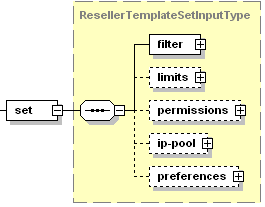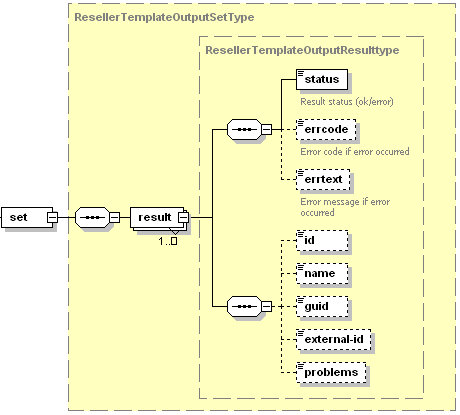Setting Reseller Plan Properties
The set operation is used to modify reseller plans.
Request Packet Structure
A request XML packet which changes settings for a specified reseller plan includes the set operation node:
<packet>
<reseller-plan>
<set>
...
</set>
</reseller-plan>
</packet>
The set node is presented by the ResellerTemplateSetInputType
complex type (reseller_template.xsd). Its graphical representation
is as follows:

Note: The interactive schema navigator for all request packets is available here: http://plesk.github.io/api-schemas/1.6.9.1/agent_input.svg.
- The filter node is required. It specifies the filtering rule.
Data type: ResellerTemplateFilterType (
reseller_template.xsd). For information on filters, refer to the Available Filters section. - The limits node is optional. It specifies limits policy and
limits on Plesk resources usage for resellers created with a reseller
plan. Data type: resellerLimits (
reseller.xsd). To view structure of this node, refer to the Limits section. - The permissions node is optional. It specifies permissions for
resellers created with a reseller plan. Data type: clientPerms
(
plesk_client.xsd). To view the structure of this node, refer to the Permissions section. - The ip-pool node is optional. It specifies IP pool settings for
resellers created with a reseller plan. Data type:
ResellerTemplateIpPoolType (
reseller_template.xsd). To view the structure of this node, refer to the IP Pool Settings section.
Response Packet Structure
The set node of the response packet is structured as follows:

Note: The interactive schema navigator for all response packets is available here: http://plesk.github.io/api-schemas/1.6.9.1/agent_output.svg.
- The result node is required. It wraps the response retrieved
from the server. Data type: ResellerTemplateOutputResulttype
(
reseller_template.xsd).- The status node is required. It specifies the execution
status of the operation. Data type: result_status
(
common.xsd). Allowed values:ok|error. - The errcode node is required if the operation fails. It returns the error code. Data type: unsignedInt.
- The errtext node is required if the operation fails. It returns the error message. Data type: string.
- The id node is required if the request packet filtered plans
by IDs and an ID was matched by a filtering rule. It returns name
the plan ID. Data type: id_type (
common.xsd). - The name node is required if the request packet filtered plans by names and a name was matched by a filtering rule. It returns name the plan GUID. Data type: string.
- The guid node is required if the request packet filtered plans by GUIDs and a GUID was matched by a filtering rule. It returns name the plan GUID. Data type: string.
- The external-id node is required if the request packet filtered plans by external IDs and an external IDs was matched by a filtering rule. It returns name the plan external ID. Data type: string.
- The problems node is optional. It contains the description of problems occurred on the operation execution. Data type: string.
- The status node is required. It specifies the execution
status of the operation. Data type: result_status
(
Samples
The following set request packet changes IP pool settings for two reseller plans, one specified by the ID and another by name.
<packet>
<reseller-plan>
<set>
<filter>
<id>12</id>
</filter>
<ip-pool>
<ip-address>192.0.2.121</ip-address>
<ip-address>192.0.2.122</ip-address>
<allocate-ip>2</allocate-ip>
</ip-pool>
</set>
<set>
<filter>
<name>base_plan</name>
</filter>
<ip-pool>
<ip-address>192.0.2.121</ip-address>
<ip-address>192.0.2.122</ip-address>
<allocate-ip>3</allocate-ip>
</ip-pool>
</set>
</reseller-plan>
</packet>
Response:
<packet>
<reseller-plan>
<set>
<result>
<status>ok</status>
<id>81</id>
</result>
</set>
</reseller-plan>
</packet>